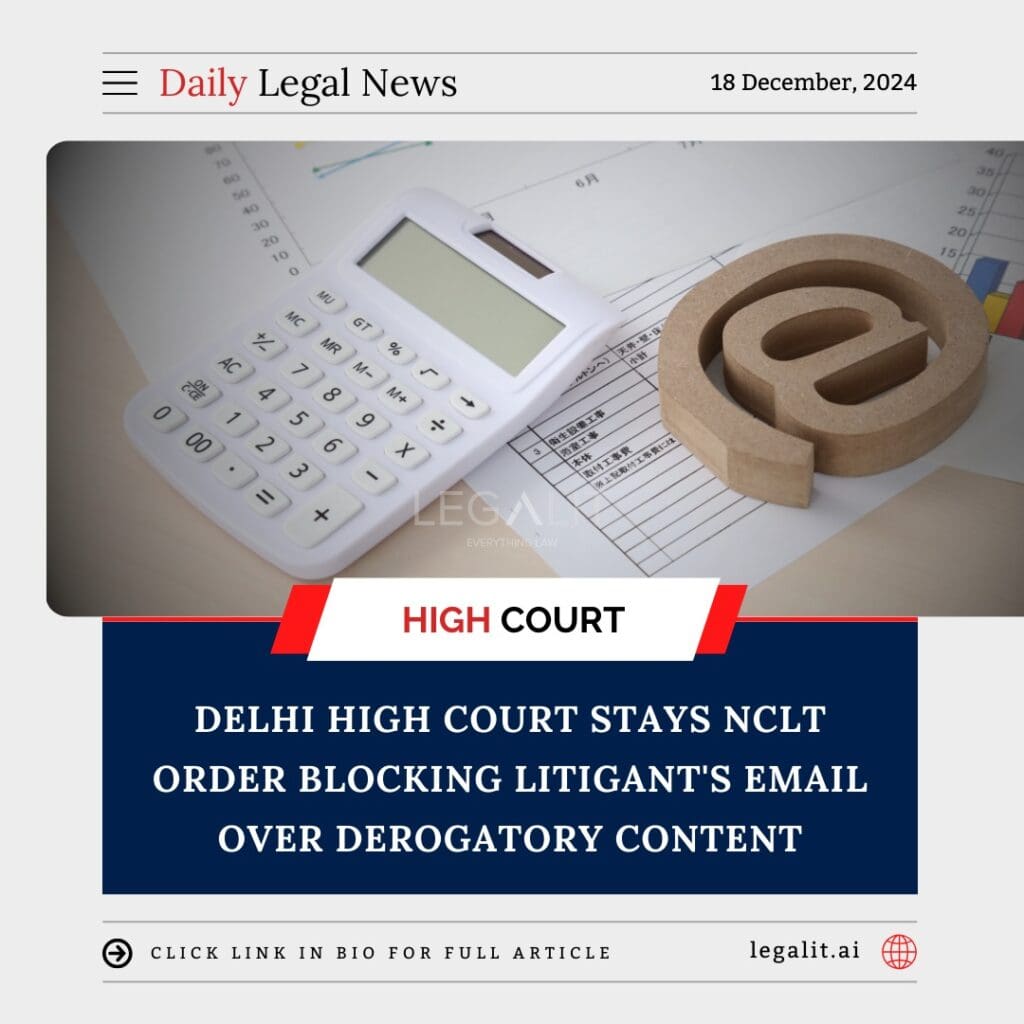
The Delhi High Court has issued a stay on an order from the National Company Law Tribunal (NCLT) that had blocked the email account of a litigant accused of sending derogatory content. The litigant had allegedly used their email account to send defamatory and abusive emails targeting individuals involved in a corporate dispute, prompting the NCLT to take action. This decision has sparked discussions on the balance between protecting individuals from harmful communication and ensuring that a litigant’s right to access justice is not unduly restricted.
Background:
The case stems from a corporate dispute where the litigant had reportedly sent multiple derogatory and offensive emails, which led to the NCLT issuing an order to block the email account in question. The order was intended to prevent further abuse and maintain the integrity of the ongoing legal proceedings.
The litigant challenged the NCLT’s decision in the Delhi High Court, arguing that blocking their email account was a disproportionate measure that violated their right to access legal remedies and communicate with their legal counsel. The litigant also contended that such an order could set a dangerous precedent, limiting individuals’ ability to participate in legal proceedings and access the judicial system.
Key Arguments:
- Litigant’s Stand:
- The litigant argued that blocking their email account was an extreme and unfair measure that infringed upon their right to communicate with their legal team.
- They contended that while the content of the emails may have been inappropriate, there were other, less restrictive ways to address the issue, such as issuing a notice or imposing a fine.
- The litigant also emphasized that the NCLT’s order could unfairly impede their ability to engage in their legal battle.
- NCLT’s Stand:
- The NCLT had acted in response to multiple complaints regarding derogatory content being circulated via the litigant’s email.
- The tribunal believed that blocking the email account was necessary to maintain decorum and prevent further disruption in the legal proceedings.
- NCLT officials argued that the litigant’s actions were damaging the reputation of those involved in the case and interfering with the legal process.
Delhi High Court’s Observations:
The Delhi High Court noted the need to balance the rights of the litigant to communicate and access justice with the need to ensure that the legal process remains orderly and free from disruptions. The court observed that while the NCLT’s intention to curb abusive behavior was understandable, a more measured approach might be required to ensure fairness and prevent undue harm to the litigant’s right to participate in the case.
The court emphasized the importance of ensuring that any action taken against a litigant does not impede their fundamental rights, especially when it involves access to legal representation and communication.
Legal and Policy Implications:
The stay on the NCLT’s order raises important questions about the extent to which tribunals and courts can restrict a litigant’s access to communication tools in order to prevent abusive behavior. The case highlights the need for a balanced approach that considers both the need to protect individuals from harassment and the right of a litigant to access legal resources and remedies.
If the Delhi High Court rules in favor of the litigant, it could set a precedent for how tribunals and courts should handle situations where abusive content is shared in the context of legal proceedings. This could lead to more careful consideration of whether blocking communication is the most appropriate course of action.
Broader Context:
The case comes at a time when online communication and email have become integral to the legal process. While these tools offer greater efficiency and access, they also raise new challenges in terms of misuse and abuse. As such, courts and tribunals must navigate the delicate balance between ensuring that legal processes remain respectful and preventing the abuse of communication channels.
Conclusion:
The Delhi High Court’s decision to stay the NCLT’s order blocking the litigant’s email account is an important development in the ongoing discussion about the rights of litigants in legal disputes. The final ruling will likely have implications for how similar cases are handled in the future, ensuring that measures taken to address abusive behavior in legal proceedings are both fair and proportionate.